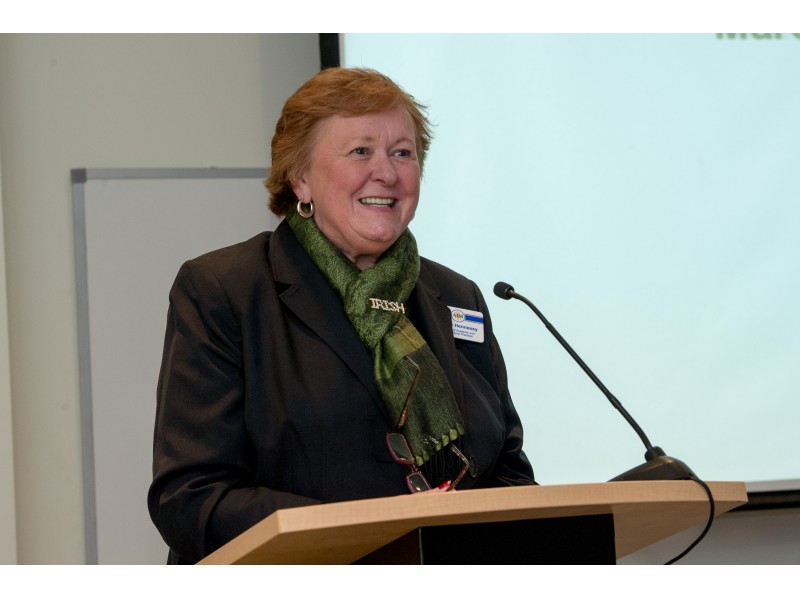Nancy Hennessy, educational consultant and past president of the International Dyslexia Association (IDA), is an experienced teacher, diagnostician, and administrator.
While in public schools, she provided leadership in the development of innovative programming for special needs students, a statewide revision of special education code and an award-winning professional development initiative. She has delivered keynote addresses, workshops and trainings to educators nationally and internationally. Her publications include articles and chapters on a range of topics including the dyslexic experience, skilled reading, a model high school program for dyslexic students and mentoring. She is a former lead trainer for Wilson Language, national trainer for Language Essentials for Teachers of Reading and Spelling (LETRS) and adjunct instructor with Fairleigh Dickinson University.
Nancy sat down with Justin Carlson, Director of Technology and Adult Learning from Hill, to discuss her upcoming visit to Durham, NC.
Tell me a little about your background.
First and foremost, I am a teacher, I was both a general and special education teacher for several years, also worked as an administrator, a supervisor of special education but perhaps, more importantly in terms of what I currently do, a Director of Professional Development. That position gave me a better understanding of how adults learn, and how important it is to think about a disciplinary knowledge that teachers should have, dependent upon their context. I have trained teachers in the Wilson Reading System, and later, in Language Essentials for Teachers of Reading and Spelling (LETRS) and consult on curriculum and professional development. This work has prompted me to continue to do my own research, pursue my own professional learning so that I would have a deep knowledge base, coupled with my experiences, to share with those that I was interacting with.
On November 30th you will be here at Hill. The topic of your workshop is “Comprehension Construction Zone: A Blueprint for Instruction”. Could you tell us more about the topic of the day, and why you chose that topic?
The topic for the day is comprehension; but more than delving into what comprehension is, thinking about how we design instruction that is effective for all our students, particularly those that struggle. We’ll be talking about a blueprint for comprehension that’s based on what we know about the language processes and skills that are necessary to extract and construct meaning from text. The follow-up sessions will delve a bit more deeply into each of the components of language comprehension and allow for participants to voice their questions, share practices, and dive more deeply into the topic.
What are the key takeaways?
I think the key takeaway will be having a blueprint for designing and delivering comprehension instruction. That blueprint aligns with the evidence and focuses on the multiple language and cognitive processes necessary for making meaning. Additionally, participants will have a deeper knowledge of the building of vocabulary, working with sentence comprehension, understanding the contribution of text structure, recognizing how critical background knowledge is, then being able to use all those processes and skills to design, and for students then, to respond to questions that reflect varied levels of understanding. The hope would be that educators would have this blueprint, they would recognize practices, strategies, activities, and routines that are evidence-based, and they would be able to apply this knowledge to their context.
You describe the format of this offering as a Community of Practice. Could you tell us what that is?
A community of practice brings together individuals who share common purpose, in this case how to design and deliver effective comprehension instruction, and it allows more interaction amongst participants, shared learning, and hopefully, an opportunity to apply what they are learning.
While at Hill you will be leading a Community Education event about the Reading Rope. Can you tell us about what a parent might gain from attending?
I think that very often we make assumptions about what it is that contributes to being able to read well, being able to simultaneously read the words and make meaning. When our students struggle, when they hit a bump in the road, oftentimes we don’t understand why. A theoretical model, such as the Reading Rope, provides us with some answers not only about what we should be focusing on in terms of instruction, but also in terms of when there is a problem with reading, thinking through where the problem is and how do we go about, intervening appropriately for a student. Often, when working with parents, we use the Reading Rope to help them better understand what it is that we are focused on, why we are focused on that, as well as when their students are struggling, what we will do to address those difficulties.
